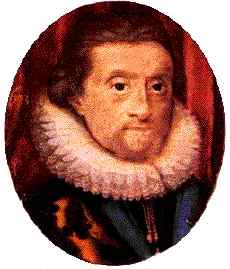James VI of Scotland, James I of England
James was an experienced monarch when he ascended the English throne, having been King of Scotland since his infancy. He received an education the equal of Elizabeth's and (in theory) developed a similarly balanced approach to governing. Like Elizabeth, James also had literary aspirations*.
On Elizabeth's death, England welcomed James and his royal family enthusiastically. People flocked to James on his way from Scotland, turning his southward journey into a grand procession. He immediately showed himself more liberal* in his favours than Elizabeth, granting over 300 knighthoods before even reaching London.
Extravagance and decline
Though himself a simple-mannered and unkempt figure, James's extravagant and indulgent* lifestyle put unsupportable strains on royal finances, already crippled by war, inflation, and Elizabeth's sale of Crown lands.
The English people were delighted once again to have a king and royal family at court, with the surety of an undisputed succession on James's death*. Ironically, though Charles succeded to the throne peacefully in 1625, he was to be overthrown not by a rival aspirant to the monarchy, but by the people (a Puritan-dominated Parliament and its army).
Footnotes
-
The literate King
Educated by the Scottish humanist George Buchanan (who earlier taught Montaigne), James took a particular interest in literature and theology. He published six treatises before the age of 34 (1600), on such subjects as the divine right of kings, witchcraft, and poetry. Shortly after settling in England he became the patron of Shakespeare's company, thereafter known as the King's Men.
Macbeth has a number of indications that it was written with the King as a privileged member of the audience. The play exploits a major interest of the king, witchcraft; it highlights the importance of Banquo, whom James claimed as an ancestor; and there is a short (flattering, but not especially relevant) scene where a doctor announces that the king is coming to cure those afflicted with the "king's evil"--a skin disease that monarchs up to the time of Samuel Johnson were thought to be able to cure by simply touching.
-
Knights, knights, and more knights
Elizabeth had grown scanty in her distribution of royal favour as rewards for service, with a consequent increase of corruption in government.
But James's apparent generosity in creating knighthoods turned against him when the gentry perceived their titles of honour to be cheapened by the ease with which others gained equal rank. Many titles were later sold, including peerages.
James created more knights before his coronation than Elizabeth did over the whole period of her reign (and most of those were not created by the Queen, but by imprudent military commanders, such as Essex).
In his casual distribution of honours, James was blithely tampering with the traditional concept of hierarchical order carried over from the Middle Ages.
-
James's indulgences
There is correspondence which survives in which James addresses his cupbearer, the young George Villiers, later Duke of Buckingham, as his "sweet child and wife." Though it was a well-kept secret, rumours of James' homosexual tendencies abounded; ironically, he wrote sternly against its practice in one of his own works, Basilicon Doron (1599). The subject is a complex one; click for more.
-
The other Prince Charles
James's eldest son Henry died in 1612, leaving Charles as heir to the throne. Charles's reserved manner and self- righteousness later proved fatal; he pushed the theory of divine right too far, and lost the trust of his most influential subjects-- the gentry of the House of Commons.
